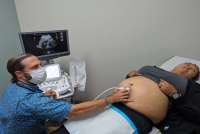Latest KFF Health News Stories
Bird Flu Is Bad for Poultry and Dairy Cows. It’s Not a Dire Threat for Most of Us — Yet.
Cattle across the country are infected by the H5N1 bird flu. The virus isn’t spreading among people — but if it evolves to do that, fears of another pandemic could be realized.
Lawsuit Alleges Obamacare Plan-Switching Scheme Targeted Low-Income Consumers
The lawsuit filed in federal court alleges that large call centers were used to enroll people into Affordable Care Act plans or to switch their coverage, all without their permission.
Rapid Rise in Syphilis Hits Native Americans Hardest
With U.S. syphilis rates climbing to the worst level in seven decades, public health experts and the federal Indian Health Service are scrambling to detect and treat the disease in Native American communities, where babies are infected at a higher rate than in any other demographic.
Avanzan en varios estados proyectos de ley extremos sobre el uso de baños por género
Al menos uno de los proyectos de ley es tan extremo como para proponer que se considere delito que una persona transgénero entre en una instalación que no coincida con el sexo indicado en su acta de nacimiento.
Bathroom Bills Are Back — Broader and Stricter — In Several States
State lawmakers are resurrecting and expanding efforts to prohibit transgender people from using public restrooms and other spaces that match their gender. Some have sought to ban trans people from “sex-designated spaces,” including domestic violence shelters and crisis centers, which experts say could violate anti-discrimination laws and jeopardize federal funding.
Toxic Gas That Sterilizes Medical Devices Prompts Safety Rule Update
The Environmental Protection Agency is tightening regulation of ethylene oxide, a carcinogenic gas used to sterilize medical devices. The agency is trying to balance the interests of the health care industry supply chain with those of communities where the gas creates airborne health risks.
Hoping to Clear the Air in Casinos, Workers Seek to Ban Tobacco Smoke
Casinos in several states are fighting efforts to ban smoking, and trying to roll back existing anti-smoking laws. One planned facility even moved outside a city’s limits because of voter-approved smoking restrictions.
California Offers a Lifeline for Medical Residents Who Can’t Find Abortion Training
Abortion restrictions in 18 states have curtailed access to training in skills that doctors say are critical for OB-GYN specialists and others. A new California law makes it easier for out-of-state doctors to get experience in reproductive medicine.
Rising Malpractice Premiums Price Small Clinics Out of Gender-Affirming Care for Minors
Even in states where laws protect minors’ access to gender-affirming care, malpractice insurance premiums are keeping small and independent clinics from treating patients.
‘Financial Ruin Is Baked Into the System’: Readers on the Costs of Long-Term Care
Thousands of people shared their experiences and related to the financial drain on families portrayed in the “Dying Broke” series, a joint project by KFF Health News and The New York Times that examined the costs of long-term care.
As Transgender ‘Refugees’ Flock to New Mexico, Waitlists Grow
As many states have moved to restrict or ban gender-affirming care for trans people, a few states, including New Mexico, have codified protections. But those laws don’t always mean accessing care is simple or quick, as a surge in new patients in the state collides with limited doctors and clinics.
Start Shopping: Enrollment Begins Nov. 1 for Most Obamacare Insurance Plans
More than 16 million Americans who buy their own health insurance through state and federal marketplaces have until Jan. 15 to compare prices, change their coverage, or enroll for the first time.
Covid Relief Payments Triggered Feds to Demand Money Back From Social Security Recipients
Some Social Security beneficiaries say the government is clawing back benefits after they received covid stimulus payments that were supposed to be exempt from asset limits.
Doctors Created a Primary Care Clinic as Their Former Hospital Struggled
With the community’s help, former co-workers came together to fill gaps in care left by the loss of doctors and departments at a Gallup, New Mexico, hospital.
As Low-Nicotine Cigarettes Hit the Market, Anti-Smoking Groups Press for Wider Standard
The first FDA-authorized cigarettes with 95% less nicotine than traditional smokes will go on sale in California, Florida, and Texas starting in early July. Anti-smoking groups oppose greenlighting just one plant biotech’s products and instead urge federal regulators to set a low-nicotine standard for the entire industry.
Advocates Call for 911 Changes. Police Have Mixed Feelings.
Though most California counties are experimenting with dispatching health professionals rather than law enforcement to respond to people experiencing mental health crises, powerful police unions fear defunding.
Black, Rural Southern Women at Gravest Risk From Pregnancy Miss Out on Maternal Health Aid
A federal program meant to reduce maternal and infant mortality in rural areas isn’t reaching Black women who are most likely to die from pregnancy-related causes.
International Rights Group Calls Out US for Allowing Hospitals to Push Millions Into Debt
In a new report, Human Rights Watch urges stronger federal and state action to hold hospitals to account for a medical debt crisis that now burdens more than 100 million Americans.
Small, Rural Communities Have Become Abortion Access Battlegrounds
After local leaders in rural Nevada reached an impasse over a proposed Planned Parenthood clinic, an anti-abortion activist pitching local abortion bans across the U.S. arrived at their remote City Hall.
New Mexico Program to Reduce Maternity Care Deserts in Rural Areas Fights for Survival
A federally funded program in remote New Mexico has helped hundreds of pregnant mothers stay healthy, but it’s running out of time and money despite a growing national maternity care crisis. The four-year, nearly $3 million grant has provided telehealth, coordinated care, and social services to mothers in need.

























